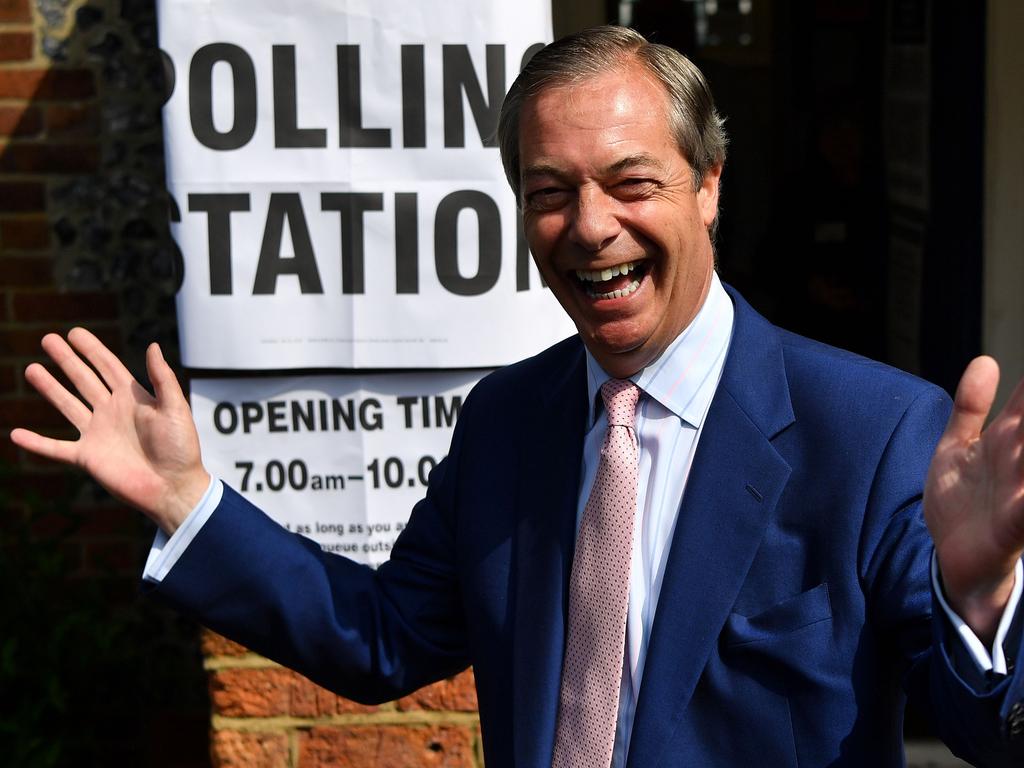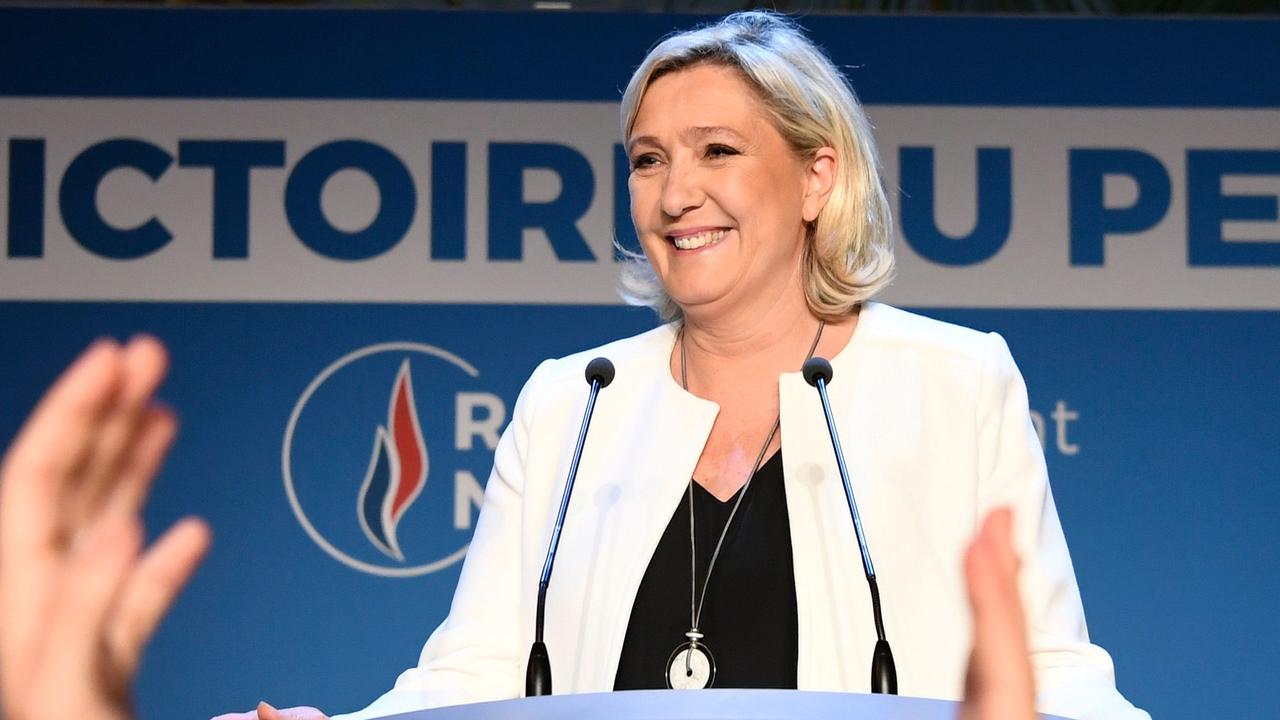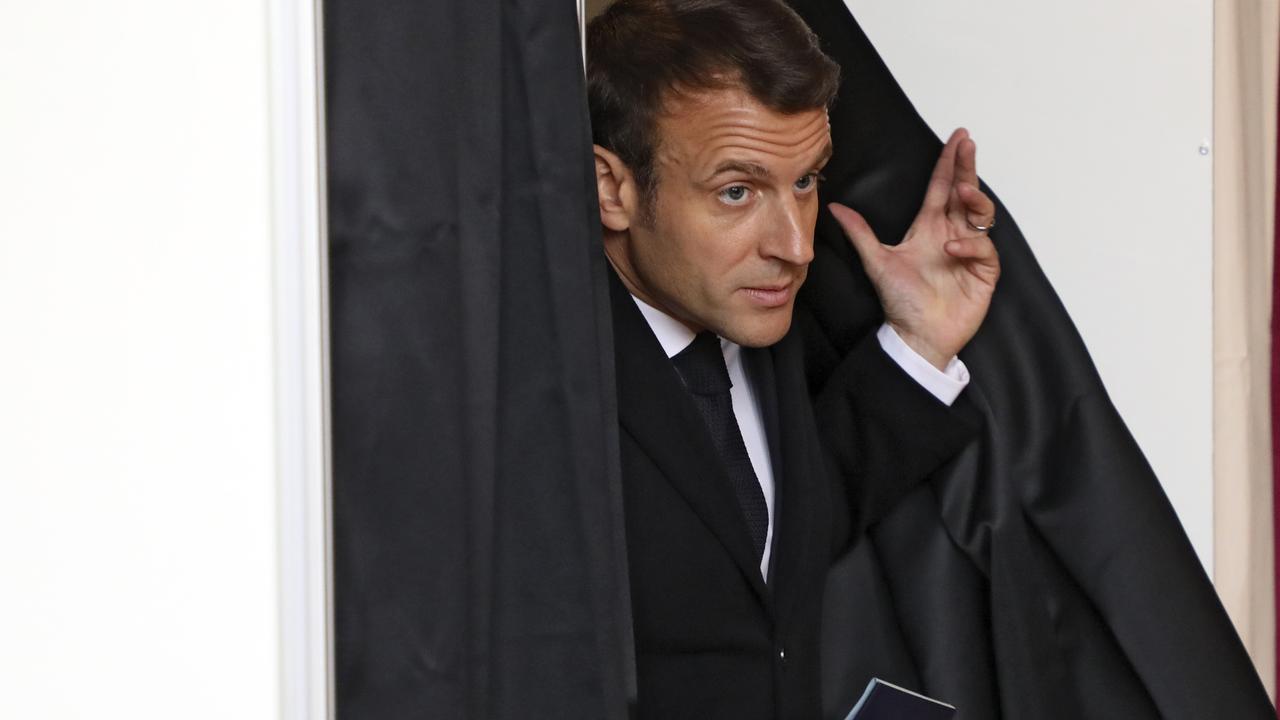Brexit Party to wipe the floor at EU elections
Europe has been left gobsmacked after election results in the UK showed a clear winner. And it’s going to throw Brexit into upheaval.
It was the election the UK shouldn’t have even been a part of.
Now Nigel Farage’s Brexit Party is set to storm to victory in the UK’s European elections, riding a wave of anger at the failure of Prime Minister Theresa May to take the country out of the European Union.
The country’s two main parties, Ms May’s Conservatives and opposition Labour, haemorrhaged support while smaller pro-EU parties did well, with the Liberal Democrats projected to come in second place.
In the UK, voting in the European Union election was coloured by a backdrop of seemingly endless Brexit paralysis.
Nearly three years after the UK voted to leave the EU, it remains a member and its politicians are still arguing over how, when and if the country will leave.
The original exit deadline in April passed by, with MPs rejecting Ms May’s deal, and her back up option of exiting with “no deal”.
Brexit’s deadline was then extended to October 31.
Ms May, who has failed to broker a workable Brexit plan, has now agreed to stand down on June 7.
From early voting results, ironically the Brexit Party is expected to win 24 seats.
The Brexit Party was in first place and was likely to do better than the UK Independence Party did in 2014, according to BBC projections. The European Parliament’s forecasts placed the Brexit Party at between 29 and 31 per cent of the vote, with overall turnout just 37 per cent.

UK’S BREXIT PARTY ROMPING TO EU POLL WIN
Britain’s governing Conservative Party faced a near-wipeout in the European Parliament election as voters sick of the country’s Brexit deadlock flocked to uncompromisingly pro-Brexit or pro-EU parties.
The main opposition Labour Party also faced a drubbing in a vote that upended the traditional order of British politics. The big winners were the newly founded Brexit Party led by the anti-EU campaigner Nigel Farage and the strongly pro-European Liberal Democrats.
With results early Monday from eight of the UK’s 12 regions, the Brexit Party had 21 of the 73 British EU seats up for grabs and about a third of the vote share. The Liberal Democrats won about 20 per cent of the vote and 10 seats — up from only one at the last EU election in 2014.
The pro-EU environmentalist Greens went from having no EU seats to five. Labour managed to win seven seats and the ruling Conservatives were in fifth place with just two EU seats and under 10 per cent of the vote.
The results reflect an electorate deeply divided over Britain’s delayed departure from the European Union, but united in anger at the two long-dominant parties, the Conservatives and Labour, who have led the UK into Brexit gridlock.
Britain is participating in the EU election because it is still a member of the bloc, but the politicians it elects will only sit in the European Parliament until it leaves the EU, which is currently scheduled for October 31.
The Conservatives were being punished for failing to take the country out of the EU as promised, a failure that led Prime Minister Theresa May to announce Friday that she is stepping down from leading the party on June 7. Britain’s new prime minister will be whoever wins the Conservative party leadership race to replace her.
A new graph shows that with 80 per cent of the vote counted, 40.3 per cent of the votes have gone to “remain” parties, while hard pro-Brexit parties have enjoyed 31.6 per cent of the vote.
UK: 80% counted.
— Europe Elects (@EuropeElects) May 26, 2019
Remain parties: 40.3%
Hard Brexit parties: 34.9%
Conservatives/Labour: 23.2%#EP2019 #Brexit #EuropeanElections2019 #EUelections2019 pic.twitter.com/we23bEk7ZT
Look at that -
— Tom French (@tomfrench85) May 26, 2019
Clear and unequivocal message that Scotland's for Europe #StopBrexit #EUelections2019 #SNP pic.twitter.com/tuZ2f6b57u
FAR RIGHT VICTORIES
Elsewhere in Europe, French far-right leader Marine Le Pen won her symbolic duel with President Emmanuel Macron on Sunday, as Eurosceptic forces made strong gains in the EU parliamentary election.
Voter turnout across Europe was estimated at 51 per cent, the highest in 20 years, suggesting more than 200 million citizens across the 28-nation bloc voted in a poll billed as a battle between populists and pro-European forces.
Mainstream parties put up enough of a defence to keep a possible majority in the 751-seat assembly — and Green parties surged in western Europe. But Le Pen’s victory, in her head-to-head with Macron, set the tone of the night.
The European assembly’s powers are slowly growing. In Europe they’ve helped to improve air flight safety, cut down on the use of plastics, end mobile telephone roaming charges within the bloc, boost data privacy, set climate change ambitions and reduce carbon dioxide emissions from cars.
The parliament also has a say in treaties, ranging from trade talks to Brexit.
There are no “European citizens” as such, so voters tend to respond to national interests.
How Europe handles migration was a very significant concern for voters in Italy, Hungary, Poland and elsewhere. Economic concerns often influence voters, and Britain’s future in the EU appeared to have been a factor again.
In France, Le Pen’s National Rally party was on track for around 24 per cent, with Macron’s centrists trailing with 22 to 23 per cent, according to two polls from Ifop-Fiducial and Harris Interactive-Agence Epoka.
Ms Le Pen’s party was already the biggest French group in the outgoing parliament, and does not seem to have gained ground, but Macron personally invested himself in the campaign and was diminished by his loss.
Italy’s far-right League, headed by Deputy Prime Minister Matteo Salvini, also won the most votes with between 27-31 per cent, according to exit polls.
Across Europe however, according to a projection prepared by the parliament, the centre-right European People’s Party (EPP) is on course to have the most seats in the assembly with 173, down sharply from 216 in 2014.
RELATED: The EU elections explained, how they work

‘MARGINALS LESS MARGINAL’
With the centre-left Socialists and Democrats (S&D) projected to win 147, down from 185, the two mainstream parties will no longer have a majority and will have to reach out to liberals to maintain a “cordon sanitaire” and exclude the far-right from decision making.
Each previous EU election since the first in 1979 has seen turnout fall, but initial figures from across the 28-nation bloc suggested this year’s culture clash has mobilised both populists and those who oppose them.
“I guess that some marginal parties will be less marginal tonight,” European Commission president Jean-Claude Juncker said as he cast his vote in his native Luxembourg.
According to exit polls, Germany’s anti-immigrant AfD broke 10 per cent in a national poll for the first time, while the mainstream socialist lost ground and the Greens moved into second place behind the ruling centre-right.
And in Belgium the far-right Flemish separatist Vlaams Belang was on course to triple its previous score.
In Finland, the far-fight Finns Party increased its vote share and retained its two EU seats. The Sweden Democrats were on course to increase their share from 9.67 to 16.9 per cent.
In his home country of Poland, European Council chief Donald Tusk expressed confidence that voters would not succumb to the approach of what he called “radical political movements, eurosceptics”.
But he admitted that the stakes were high: “The first priority, not only for this institution, is to save the EU as a project, not only at this time but in the long term, and I’m sure that they will manage.”
‘POWERFUL GROUP’
Eurosceptic parties opposed to the project of ever closer union hope to capture as many as a third of the seats in the EUparliament, disrupting Brussels’ pro-integration consensus.
The far-right parties of Italian Deputy Prime Minister Matteo Salvini and France’s Le Pen led the populist charge, but anti-EU ranks will also be boosted by the Brexit Party of British populist Nigel Farage.
Macron had taken it upon himself to act as figurehead for the centrist and liberal parties, and Le Pen took up his challenge.
“The gains for our allies in Europe and the emergence of new forces across the continent … open the way for the formation of a powerful group,” said the lead campaigner for Le Pen’s National Rally, Jordan Bardella.
Another nationalist party, the Fidesz of Hungary’s Prime Minister Viktor Orban, was on course for a massive 56 per cent victory, according to a poll conducted Sunday.

EUROPEAN DEMOCRACY ‘ALIVE’
Turnout was much higher in many countries than in 2014, a historic low. German conservative Manfred Weber, lead candidate for the centre-right EPP group hailed the public interest, declaring: “European democracy is very much alive.” The mainstream parties are vying between themselves for influence over the choice of a new generation of top EU officials, including the powerful president of the European Commission.
Britain and the Netherlands were first to vote, on Thursday, followed by Ireland and the Czech Republic on Friday with Slovakia, Malta and Latvia on Saturday, leaving the bulk of the 400 million eligible voters to join in on Sunday.
Even if Britain leaves the European Union on October 31, the latest deadline set for its Brexit date, its MEPs could still play a role in this summer’s scramble to hand out top jobs.
Thursday’s votes from Britain will not be counted until after polls close in Italy, but Farage’s Brexit Party appears on course to send a large delegation to a parliament it wants to abolish.
But much will depend on who gets the top jobs: the presidencies of the Council and the Commission, the speaker of parliament, the high representative for foreign policy and director of the European Central Bank.
EU leaders have been invited to a summit on Tuesday to decide the nominees. The EPP is insisting on Weber for the Commission, but Macron and some others oppose choosing a parliamentarian.



